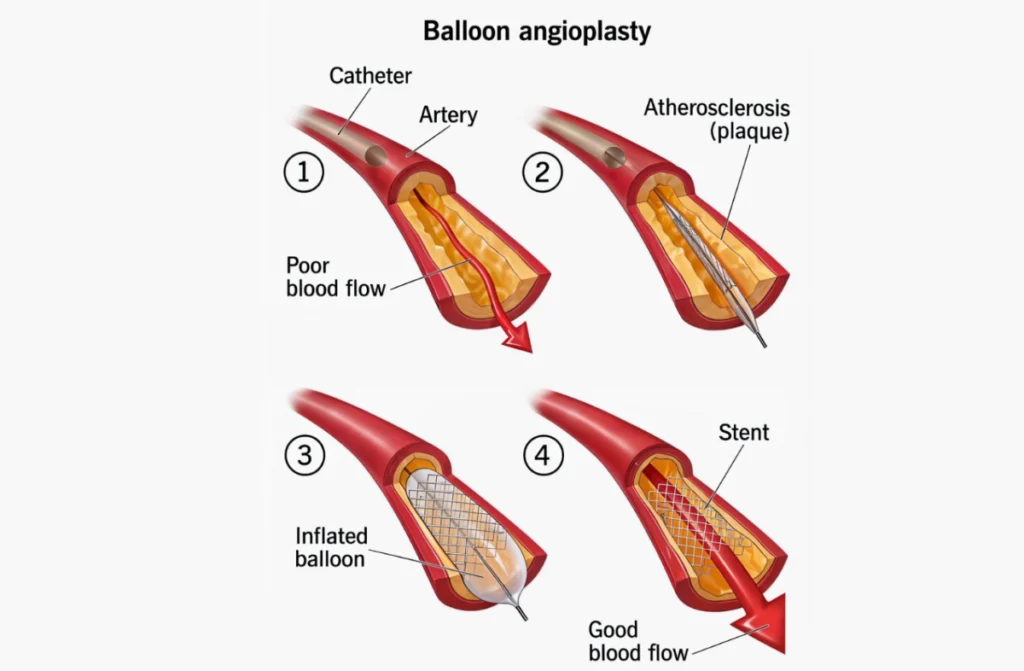Angioplasty and stent placement are essential procedures designed to address blocked arteries, a common cause of coronary artery disease. By employing cutting-edge technology, these procedures restore normal blood flow to the heart, alleviate discomfort, and reduce the likelihood of heart attacks. At CTS Hospital, our experienced cardiology team ensures a personalized approach to both the procedure and recovery, focusing on the best possible outcomes for our patients.

Understanding Coronary Angioplasty
Coronary angioplasty and stent placement is a non-surgical procedure used to open up narrowed or blocked arteries in the heart. During this procedure, a catheter is inserted through a small incision and guided to the site of the blockage. Once in place, a balloon is inflated to widen the artery. To prevent it from closing again, a stent is typically placed. The combination of these two methods works together to restore healthy blood circulation.
- A catheter is navigated to the blocked artery under imaging guidance.
- The balloon is inflated to clear the obstruction and expand the artery.
- A stent is deployed to maintain the artery’s openness, ensuring continued blood flow.
By addressing the root cause of chest pain and heart attack risks, angioplasty and stent placement for the heart significantly enhances heart health.
Why Choose Coronary Angioplasty?
This procedure offers numerous advantages, making it a widely chosen method for managing coronary artery disease. Let’s explore why angioplasty and stent placement can be transformative:
- Effective Pain Relief: Relieves symptoms of angina, providing relief from persistent chest pain.
- Reduced Heart Attack Risk: Lowers the chances of a future heart attack by clearing arterial blockages.
- Minimally Invasive: Unlike traditional open-heart surgery, angioplasty requires only a small incision, minimizing recovery time.
- Improved Quality of Life: Many patients experience significant improvements in their daily activities and overall health post-procedure.
At Cts Hospitals, our expert team ensures that you experience the full benefits of this advanced procedure.
The Safety Profile of Angioplasty
Coronary angioplasty and stent placement, coupled with stent placement, is considered safe for most patients. With the aid of modern medical techniques and highly skilled cardiologists, risks are minimized. Here’s why the procedure is so reliable:
- Guided Precision: Real-time imaging ensures that the catheter is precisely positioned, minimizing risks during the procedure.
- Advanced Stent Technology: We use drug-eluting stents that help prevent re-narrowing of the arteries, reducing the risk of complications.
- Continuous Care: Post-procedure monitoring ensures early detection of any potential complications, leading to swift management.
At Cts Hospitals, your safety is our top priority, and we take extensive measures to ensure a smooth, successful treatment.
Risks to Consider in Angioplasty
While angioplasty and stent placement are largely safe, as with any medical procedure, there are some risks involved. It’s important to be aware of these potential complications:
- Minor Bleeding: Some bleeding may occur at the site where the catheter was inserted, though it is typically controlled easily.
- Restenosis: In some cases, arteries can re-narrow over time, though this is rare with the use of modern stents.
- Blood Clots: Clots may form around the stent, which can be managed with medication.
- Serious Events: While extremely rare, heart attacks or strokes can occur during or following the procedure.
Our team at Cts Hospitals is trained to manage these risks, ensuring the safest possible experience for our patients.
The Procedure: Step-by-Step
Pre-Procedure
Before undergoing angioplasty and stent placement for the heart and stent placement, you will be thoroughly evaluated. This includes blood tests, imaging studies like ECG, and possibly a coronary angiogram to assess the condition of your arteries. Depending on your medical history, you may be prescribed blood-thinning medications to reduce the risk of clotting. It is important to follow your doctor’s instructions regarding fasting or other preparations before the angioplasty and stent placement procedure.
During the Procedure
angioplasty and stent placement procedure is typically done under local anesthesia. A catheter is inserted, usually in the groin or wrist area, and guided to the blocked artery. A balloon is inflated to widen the artery, followed by stent placement to ensure it stays open. The process is done in a catheterization lab (Cath Lab) and usually takes between 30 to 60 minutes. Although the procedure is minimally invasive, patients often feel some mild pressure during it.
Post-Procedure Recovery
After the procedure, you will be monitored for a few hours to ensure everything is functioning well. Some discomfort may be felt at the insertion site, and it is common to feel tired for the first 24-48 hours. Your cardiologist will prescribe blood thinners to reduce clot risks, and you’ll be given guidelines for resuming activities gradually.
Recovery and Lifestyle Modifications
1. Immediate Recovery
Following angioplasty, you will be observed for any complications and generally stay in the Heart Specialist Hospital for a day or two. Most patients are able to return home within 1-2 days, although you will need to avoid strenuous physical activity for a few weeks to allow for proper healing.
2. Medications
It is crucial to take prescribed medications, especially blood thinners, as instructed. These medications help prevent clot formation around the stent and are a critical part of your recovery plan.
3. Post-Procedure Activity
While light walking is encouraged soon after the procedure, you should avoid lifting heavy objects or engaging in strenuous activities for at least a week. Your cardiologist will provide a personalized timeline for resuming normal activities.
4. Cardiac Rehabilitation
To support your long-term recovery and heart health, cardiac rehabilitation programs may be recommended. These programs combine physical activity, nutritional counseling, and stress management techniques to help you regain strength and reduce the risk of future heart issues.
Conclusion
Angioplasty and stent placement are life-saving treatments for individuals with coronary artery disease, providing a rapid, minimally invasive solution to restore blood flow and reduce heart disease risks. The procedure can drastically improve both heart health and quality of life. At Cts Hospitals, we prioritize delivering personalized care, using the most advanced technologies to ensure the best possible outcomes. Get in touch with us today to explore how angioplasty and stent placement can benefit your heart health.
